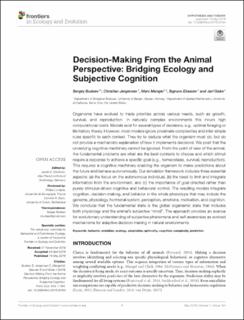| dc.description.abstract | Organisms have evolved to trade priorities across various needs, such as growth, survival, and reproduction. In naturally complex environments this incurs high computational costs. Models exist for several types of decisions, e.g., optimal foraging or life history theory. However, most models ignore proximate complexities and infer simple rules specific to each context. They try to deduce what the organism must do, but do not provide a mechanistic explanation of how it implements decisions. We posit that the underlying cognitive machinery cannot be ignored. From the point of view of the animal, the fundamental problems are what are the best contexts to choose and which stimuli require a response to achieve a specific goal (e.g., homeostasis, survival, reproduction). This requires a cognitive machinery enabling the organism to make predictions about the future and behave autonomously. Our simulation framework includes three essential aspects: (a) the focus on the autonomous individual, (b) the need to limit and integrate information from the environment, and (c) the importance of goal-directed rather than purely stimulus-driven cognitive and behavioral control. The resulting models integrate cognition, decision-making, and behavior in the whole phenotype that may include the genome, physiology, hormonal system, perception, emotions, motivation, and cognition. We conclude that the fundamental state is the global organismic state that includes both physiology and the animal's subjective “mind”. The approach provides an avenue for evolutionary understanding of subjective phenomena and self-awareness as evolved mechanisms for adaptive decision-making in natural environments. | en_US |

